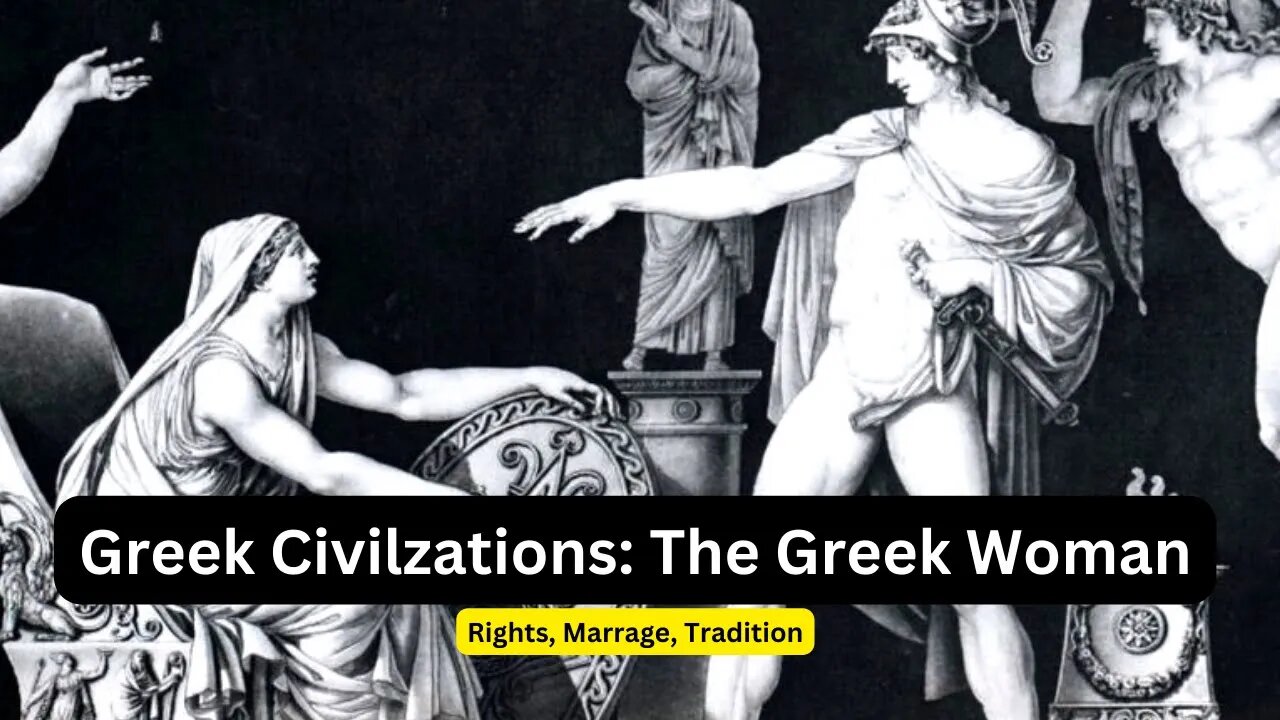Premium Only Content

12. Ancient Greece Civilization: The Life of Greek Women - Lifestyle, Rights, Marriage, and More.
The role and status of women in ancient Greek civilization varied depending on the city-state and time period. In general, women were considered to be inferior to men and had limited rights and opportunities.
In Athens, for example, women were not allowed to participate in the political life of the city-state and were not considered citizens. They were also not allowed to vote, hold public office, or serve in the military. Athenian women were expected to marry, bear children, and manage the household. They were also expected to be loyal and obedient to their husbands and fathers.
In Sparta, women had more freedom and rights compared to other Greek city-states. They were not confined to the home and were encouraged to engage in physical activity and sports, which helped to develop their physical strength and stamina. Spartan women were also given a level of education, which was unusual for women in ancient Greece.
However, it is important to note that the status of women in ancient Greece varied depending on their social class, family background, and individual circumstances. Wealthy women, for example, had more opportunities and freedom than poor women, who were more likely to be confined to domestic duties.
In both Athens and Sparta, women were not allowed to participate in the political life of the city-state, and their role was primarily confined to the domestic sphere. They were not able to vote, hold public office, or serve in the military.
In general, women in ancient Greece had limited rights and opportunities compared to men, and their role was primarily confined to the domestic sphere. The limitations on the life of Greek women were largely defined by the patriarchal society in which they lived.
-
 11:06
11:06
The Pascal Show
12 hours ago $0.46 earned'THEY'RE GETTING DEATH THREATS!' Jake Haro's Lawyer Breaks Silence On Emmanuel Haro's Disappearance!
4.67K -
 LIVE
LIVE
Lofi Girl
2 years agoSynthwave Radio 🌌 - beats to chill/game to
403 watching -
 2:19:32
2:19:32
Badlands Media
1 day agoDEFCON ZERO Ep. 005: False Flags, Cyber Fronts & Global Power Plays
140K57 -
 2:35:23
2:35:23
FreshandFit
7 hours agoWhy Black Men Don't Date Black Women Debate
32.5K33 -
 2:03:42
2:03:42
Inverted World Live
11 hours agoBigfoot Corpse Coming to the NY State Fair | Ep. 94
104K24 -
 6:16:23
6:16:23
SpartakusLIVE
12 hours ago$1,000 Pistol Challenge || #1 ENTERTAINER of The EONS Eradicates BOREDOM
80.3K2 -
 2:33:37
2:33:37
TimcastIRL
9 hours agoTrump Orders Review of Smithsonian For Being Woke & Out of Control | Timcast IRL
182K74 -
 3:09:10
3:09:10
Barry Cunningham
12 hours agoPRESIDENT TRUMP HAS TAKEN THE MONSTER AWAY FROM THE LEFT! HORROR STORIES WON'T WORK ANYMORE!
81.6K80 -
 1:29:55
1:29:55
WickedVirtue
7 hours agoLate Night Fortnite w/ Friends
50.9K -
 3:34:06
3:34:06
This is the Ray Gaming
7 hours ago $1.07 earnedCould you be? Would you be? Won't you be my RAYBOR? | Rumble Premium Creator
30.9K